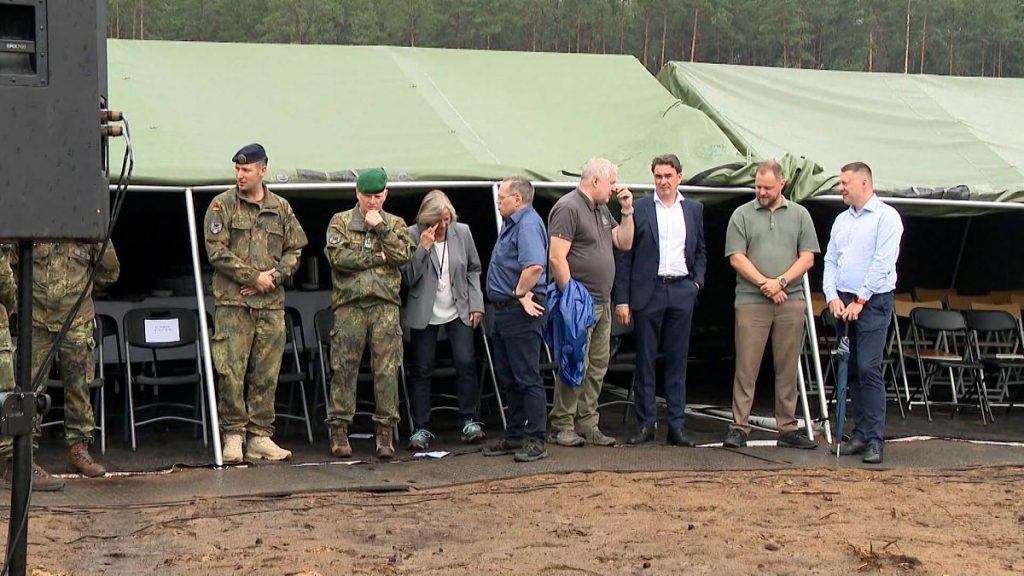Construction of a new military base for a newly deployed German brigade in Lithuania has begun at the Rudninkai training ground, located just a few kilometres south of the capital city of Vilnius. The decision to permanently deploy a German brigade in Lithuania came following the Russian invasion of Ukraine in 2022, with officials from both countries participating in a symbolic ceremony at the construction site. The camp will cover 200 hectares of land and include a variety of buildings such as administration offices, maintenance facilities, dormitories, and more. The German brigade is expected to consist of around 5,000 soldiers, with a third of them bringing their families. Berlin intends to keep the brigade stationed in Lithuania until 2027, with the pace of relocation depending on Lithuania’s readiness to receive the soldiers and their families.
The construction of the new camp marks a significant effort by the German armed forces, with investments related to the deployment of the brigade estimated to reach 800 million euros, according to Lithuania’s Ministry of National Defence. Lithuanian Defence Minister Laurynas Kasčiūnas highlighted the shift in NATO’s planning process, emphasizing the importance of deterrence through denial by ensuring a strong military presence to prevent any potential threats to Lithuania’s territory. The agreement between Lithuania and Germany reflects a commitment to enhancing security measures in the region in response to recent geopolitical tensions. The permanent deployment of a German brigade in Lithuania signifies a strategic partnership aimed at strengthening defense capabilities and promoting stability in the Baltic region.
The new camp in Rūdninkai will serve as a significant infrastructure project, providing the necessary facilities to support the operations of the German brigade. The construction of various buildings, including administration offices, maintenance facilities, and residential dormitories, demonstrates a long-term commitment to the presence of German forces in Lithuania. The camp is part of a larger effort to enhance NATO’s collective defense posture in the region, with the goal of deterring potential threats and maintaining security and stability. By investing in military and training related to the deployment of the brigade, Lithuania and Germany are demonstrating their readiness to respond to evolving security challenges and uphold their commitment to protecting the sovereignty of NATO member states.
The decision to establish a permanent presence of a German brigade in Lithuania is a significant step towards enhancing the security and defense capabilities of the region. The deployment of a sizable military force, consisting of around 5,000 soldiers, reflects a commitment to deterring potential threats and ensuring the protection of Lithuania’s territory. By building a new camp in Rūdninkai and investing in the necessary infrastructure, Lithuania and Germany are sending a strong message of solidarity and cooperation within NATO. The strategic partnership between the two countries highlights the importance of collective defense and mutual support in the face of geopolitical challenges, with a focus on safeguarding the territorial integrity and sovereignty of Baltic states.
The development of the new camp in Rūdninkai underscores the growing importance of security cooperation among NATO allies in response to evolving threats in the region. The decision to station a German brigade in Lithuania represents a coordinated effort to strengthen the defense capabilities of NATO member states and enhance deterrence measures. The construction of the camp and the investment in military infrastructure demonstrate a shared commitment to maintaining security and stability in the Baltic region. By working together to establish a permanent presence of German forces in Lithuania, both countries are contributing to a collective defense posture that aims to deter aggression and uphold the principles of the NATO alliance.
Overall, the construction of a new military base for a German brigade in Lithuania represents a significant milestone in enhancing security cooperation and defense capabilities in the Baltic region. The decision to establish a permanent presence of German forces reflects a commitment to deterring potential threats and ensuring the protection of NATO member states. By investing in the necessary infrastructure and facilities to support the operations of the brigade, Lithuania and Germany are actively contributing to the collective defense posture of the alliance. The construction of the new camp in Rūdninkai signifies a strategic partnership aimed at promoting security and stability in the region, with a focus on safeguarding the sovereignty and territorial integrity of Baltic states.













